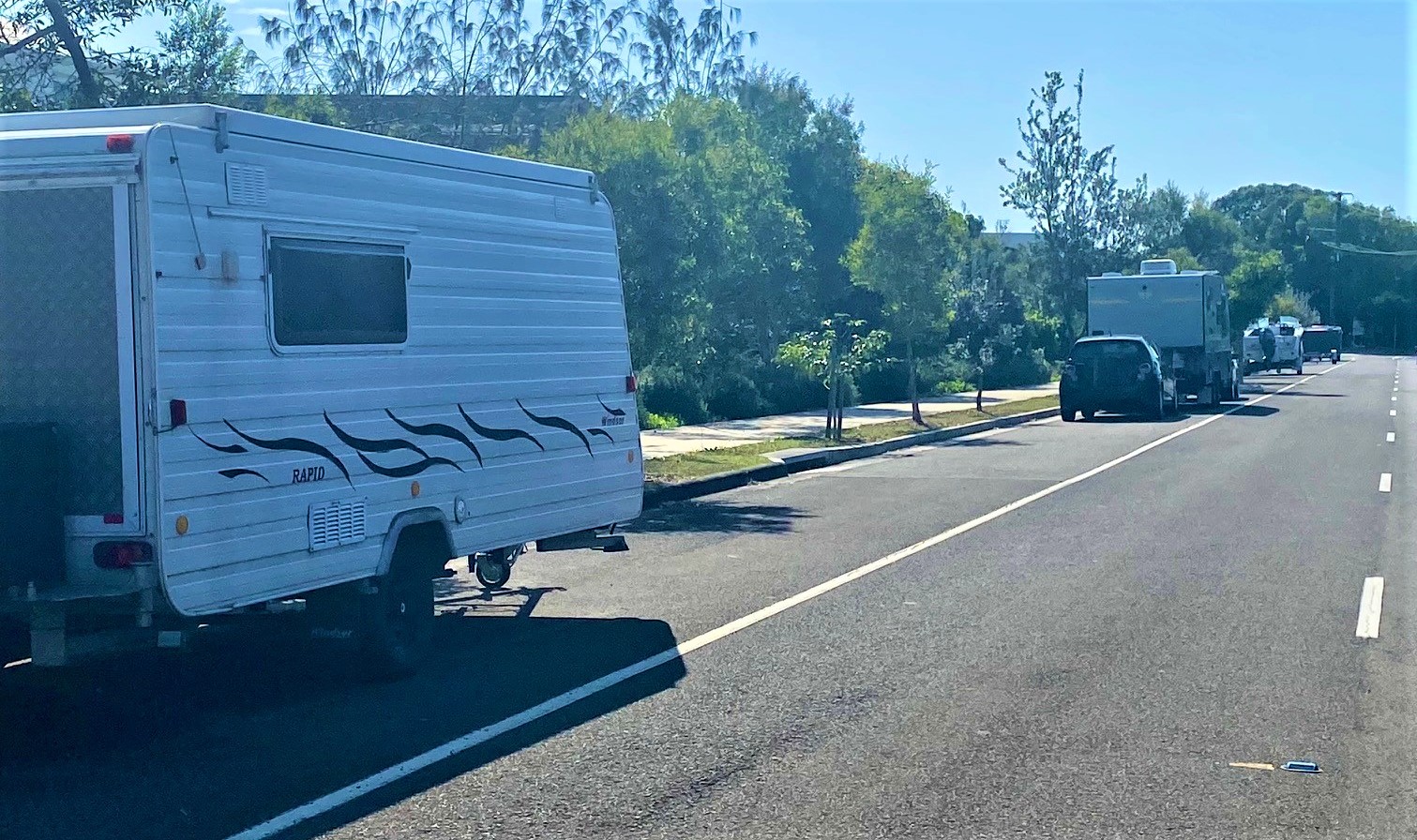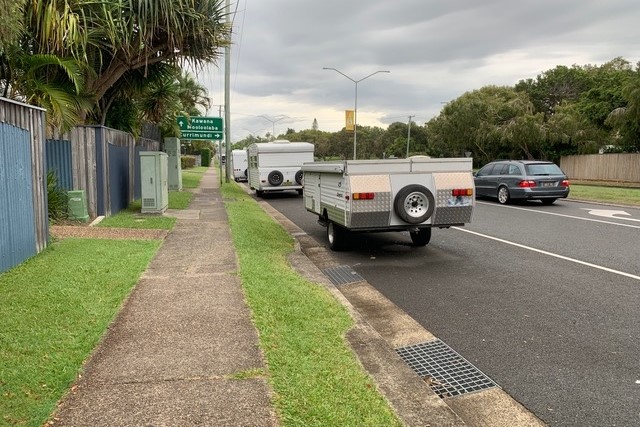A local council is being urged to consider new local laws that restrict the long-term parking of caravans and other large recreational vehicles on public streets.
Sunshine Coast Council has asked the state government to investigate options for managing the issue, submitting a motion for the Local Government Association of Queensland’s annual conference in October.
But the state government has said councils are best placed to handle the issue locally, by making local laws and erecting signs to restrict the long-term parking of vehicles.
It comes as another petition on the issue has been launched, following on from one started by a Palmview resident after two caravans were parked on either side of his driveway on Laxton Road.
The latest petition, titled ‘Regulation of Long-Term and Unsafe On-Street Parking of Caravans, Campervans and Motorhomes’, has had more than 500 signatures since it launched on July 30.
“We, the undersigned residents, ratepayers and concerned citizens of the Sunshine Coast, hereby petition the Sunshine Coast Council to take immediate and decisive action to regulate the long-term, unsafe and unattended parking of caravans, campervans, motorhomes and other large recreational vehicles (including boats and trailers) on public streets and council-controlled land,” it says.
It cites loss of public amenity and parking, public safety, obstruction of public pathways, neighbourhood character and environmental concerns, and inadequate current regulations as reasons for the call for action.
To fix the issue, the petition asks the council to review and amend local laws, establish clear time limits, strengthen enforcement and prohibit unsafe parking.
A Department of Transport and Main Roads spokesperson said the council had the powers to be able to deal with the problem locally.
“Queensland law authorises local governments to regulate parking in their area, including enforcing parking on state-controlled roads with approval from TMR,” they said.
Do you have an opinion to share? Submit a Letter to the Editor at Sunshine Coast News via news@sunshinecoastnews.com.au. You must include your name and suburb.
“This ensures parking is tailored for local community needs. Local governments can regulate parking by installing official signs or making local laws.
“Local governments have a range of existing options to regulate the parking of recreational vehicles on roads, such as caravans and boat trailers. The most effective option is through the installation of signage, as this provides clear guidance at impacted locations and doesn’t rely on a prior understanding of rules. Parking signs can be location specific or across a broad area, and can specify the types of vehicles that can or cannot be parked and for how long.
“Local governments also have powers to remove vehicles from roads that have been abandoned or parked unsafely.
“Parking is only regulated at a state level in circumstances where consistent rules are required across the state. The Queensland road rules are also substantially modelled on national rules to achieve consistency across jurisdictions.
“While issues with the parking of recreational vehicles appears to be a localised, we are happy to work with local governments to support local solutions.”
A council spokesperson has previously told Sunshine Coast News the council considered parking and kerbside management controls in line with its Parking Management Plan and associated Local Area Parking Plans.
“If residents have any issues or concerns about their areas, they can log a request with council, which we will consider, investigate where warranted and provide a response,” they said.

Registered caravans, boats and other RVs are allowed to park on any road in accordance with the Transport Operations (Road Use Management) Act 1995, the Transport Operations (Road Use Management – Road Rules) Regulation 2009 and its local laws.
The spokesperson said these vehicles could remain parked unless a parking control sign was in place, indicating a time limit.
Sunshine Coast councillors voted unanimously to carry the LGAQ motion at their ordinary meeting in July.
“This motion seeks to address a matter that is increasingly causing concern across the community in relation to the storage of recreational vehicles on roads,” it said.
“The motion calls on the state government to investigate and develop options for managing the storage of recreational vehicles on roads which can have negative impacts in relation to safety, parking capacity and amenity.
“While Sunshine Coast Council has explored intervention options, the Transport Operations (Road Use Management) Act 1995 does not provide practical options for local governments to address this issue without affecting all vehicles parked in the local government area.”
The motion includes a case study section, where it considers possible actions to address the problems.
“There are examples where local governments have attempted to introduce a vehicle-specific local law to manage long-term parking issues,” it said.
“In these cases, the local governments have received feedback from the state that unless the classification of vehicle is recognised under state legislation, the implementation of the law is likely to be unsuccessful.”
It also cites the NSW Public Spaces (Unattended Property) Act 2021, which it said allowed councils to give notice to the owner of an unattended vehicle, requiring it to be moved within 15 days if registered and left unattended in one place for more than 28 days.
“The act has provided councils with stronger powers and penalties to manage unattended property, including shopping trolleys, unregistered cars, trailers and stray stock animals,” it said.
“The new laws mark the biggest change to impounding laws in nearly 30 years and aim to keep public spaces safe, accessible and enjoyable for the community.”
The LGAQ was contacted but said it does not provide commentary on motions before they go to its membership.
“Each year ahead of the LGAQ’s annual conference, councils put forward motions to be debated and voted on by their fellow Queensland councils,” a spokesperson said.
“If supported by the membership, they become part of the LGAQ’s advocacy platform on behalf of councils and their local communities.”
It is understood TMR would review any LGAQ motion on the issue to determine feasibility and ensure local governments understand their existing powers.
The latest petition urges the council to handle the matter by introducing new restrictions and enforcement strategies.
“The current local laws and their enforcement appear insufficient to address the scale of this growing issue, allowing the problem to persist and worsen across the Sunshine Coast region,” it says.
“The increasing number of caravans and large recreational vehicles being left on public streets for extended periods – sometimes for weeks or months – significantly reduces the availability of essential on-street parking for residents and their visitors. This is particularly problematic in residential areas and near public amenities like parks and beaches.
“These large vehicles frequently obstruct sightlines for drivers at intersections, junctions and private driveways, creating a serious safety risk for motorists, cyclists and pedestrians. When parked on narrow streets, they can impede the access of emergency service vehicles such as ambulances and fire trucks.
“The long-term storage of caravans on our streets detracts from the visual amenity and character of our neighbourhoods. Furthermore, there are concerns regarding the potential for illegal dumping of greywater or other waste from vehicles being used for unofficial camping.”
Click here to see the petition.





